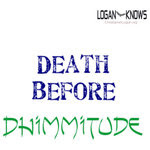
Obviously I have posted numerous articles here about non-Muslim Brits catering to Islam. To be honest, the US is no better in this regard. Michigan medical students have played right into the hand of the U-M’s Muslim Medical Students Association who had sponsored Fast-A-Thon Wednesday. Trust me it wouldn't be long until the non-Muslims students are asked to do more to "understand" Muslims. Our clock is ticking, and we are not even fighting.
University of Michigan medical school students, faculty fast for a day to better understand Muslim patients
Tina Reed
Long before sunrise Wednesday morning, second-year University of Michigan medical student Jess Guh and some of her classmates dragged themselves to Denny’s restaurant to grab a bite to eat.
They don’t typically eat that early, but they wanted to get something in their stomachs before fasting for the Muslim observance of Ramadan.
“It’s the only place that’s open at 4 in the morning,” Guh said.
She and many of her medical school friends aren’t Muslim, but as future physicians, they were trying to better understand how annual Ramadan fasting would affect the lives of their Muslim patients.
They were among about 100 students and about a dozen faculty who participated in the Muslim Medical Students Association’s Fast-A-Thon Wednesday. The event encourages members of the medical school community to try to adhere to the traditional fast from eating or drinking anything between dawn to dusk for one day of Ramadan. U-M was one of many campuses across the United States with similar events.
SNIP
The observance is meant to teach charity and patience, among other things, said Hasan Siddiqi, a leader of U-M’s Muslim Medical Students Association. On Wednesday evening, they attended a reception to break the fast with Pakistani foods, and several speakers talked about the significance of the observance.
The idea behind the event is that if a provider can understand where a patient is coming from in their religious practices, they’ll be able to find ways to accommodate those practices or better explain why they aren’t medically safe, Siddiqi said.
The hope is to also build awareness and commonality between Muslims and non-Muslims in the medical community, he said.
Still dressed in his scrubs from his rotation in the surgery department Wednesday, Wajeeh Muhammad — who is Muslim — said he appreciated the effort many of his non-Muslim counterparts were making. It will benefit them in the future as physicians, he said.
“The first couple days of this are tough. The most difficult part is not drinking water. It is tiring,” Muhammad said.
Link to Article






No comments:
Post a Comment